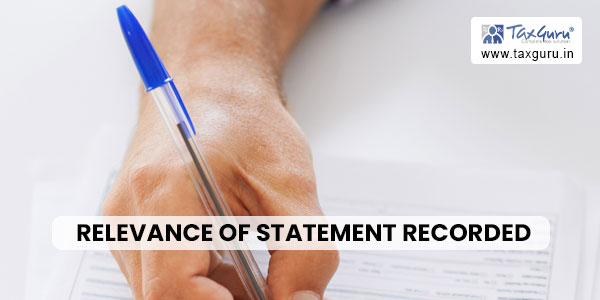When it comes to the admissibility of statements recorded under Section 70 of the CGST Act, there is a distinction between their relevance in prosecution proceedings and adjudication proceedings. In this article, we will analyze the provisions of the Act and shed light on whether such statements hold relevance in adjudication proceedings.
Summons in layman terms is officially call upon to person.
Section 70 of the CGST Act empowers to concerned officer to issue summon to person to give evidence and produce documents.
Whether the department can rely of the statement recorded u/s. 70 of the CGST Act for adjudication proceedings as per Provision of section 73, 74 & 122 of the CGST Act.

Before discussing the relevancy of the statement, I would like to produce section 9D of the Central Excise Act, 1944 (Hereinafter referred to as “Old regime”) and section 136 of the Central Goods & Services Tax Act, 2017 (hereinafter referred to as “CGST Act”) which are as under:
|
CENTRAL EXCISE ACT, 1944 |
Central Goods & Services Tax Act, 2017 |
| SECTION 9D Relevancy of statements under certain circumstances. –
(1) A statement made and signed by a person before any Central Excise Officer of a gazetted rank during the course of any inquiry or proceeding under this Act shall be relevant, for the purpose of proving, in any prosecution for an offence under this Act, the truth of the facts which it contains, – (a) when the person who made the statement is dead or cannot be found, or is incapable of giving evidence, or is kept out of the way by the adverse party, or whose presence cannot be obtained without an amount of delay or expense which, under the circumstances of the case, the Court considers unreasonable; or (b) when the person who made the statement is examined as a witness in the case before the Court and the Court is of opinion that, having regard to the circumstances of the case, the statement should be admitted in evidence in the interests of justice. (2) The provisions of sub-section (1) shall, so far as may be, apply in relation to any proceeding under this Act, other than a proceeding before a Court, as they apply in relation to a proceeding before a Court. |
SECTION 136. Relevancy of statements under certain circumstances. –
A statement made and signed by a person on appearance in response to any summons issued under section 70 during the course of any inquiry or proceedings under this Act shall be relevant, for the purpose of proving, in any prosecution for an offence under this Act, the truth of the facts which it contains, – (a) when the person who made the statement is dead or cannot be found, or is incapable of giving evidence, or is kept out of the way by the adverse party, or whose presence cannot be obtained without an amount of delay or expense which, under the circumstances of the case, the court considers unreasonable; or (b) when the person who made the statement is examined as a witness in the case before the court and the court is of the opinion that, having regard to the circumstances of the case, the statement should be admitted in evidence in the interest of justice. |
> Provision of section 136 of the CGST Act proclaims that any statement recorded by the concerned officer during the course of any inquiry or proceedings under this Act shall be relevant for the purpose of proving the truth of the facts in any prosecution for an offence under this Act, which it contained therein:
a) when the person who made the statement is dead.
b) when the person who made the statement cannot be found.
c) when the person who made the statement is incapable of giving evidence.
d) when the person who made the statement is kept out of the way by the adverse party, and
e) when the presence of the person who made the statement cannot be obtained without unreasonable delay or expense.
> Clause (b) of section 136 of the CGST Act proclaims that when the person who made the statement is examined as a witness in the case before the court and the court is of the opinion that, having regard to the circumstances of the case, the statement should be admitted in evidence in the interest of justice. Then the statement shall be relevant.
> We can infer u/s. 136 of the CGST Act, 2017 does not have a provision similar to Sub-Section (2) of Section 9D of old law. Therefore, it is clear that under GST Law, any Statement made by a person under Section 70 of the CGST Act is relevant for the purpose of a prosecution proceeding before the Court rather than in adjudication proceedings and appeals arising there from.
> In other words, we can say that any statement recorded under Section 70 cannot be used as evidence by the concerned officer in adjudication proceedings as it is relevant only in prosecution proceedings before the Court.
Conclusion: Based on the provisions of the CGST Act, it is clear that statements recorded under Section 70 have limited relevance in adjudication proceedings. While these statements hold significance in prosecution proceedings before the court, they cannot be used as evidence by the concerned officer in adjudication proceedings. It is crucial for taxpayers and professionals to understand this distinction to ensure compliance with the appropriate legal procedures.




